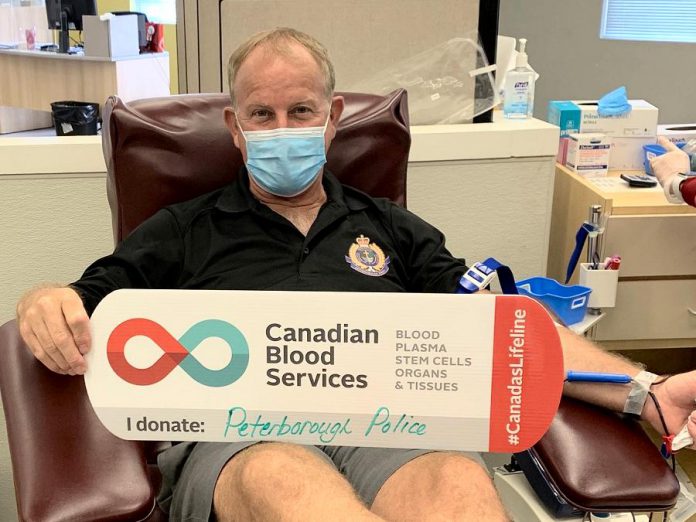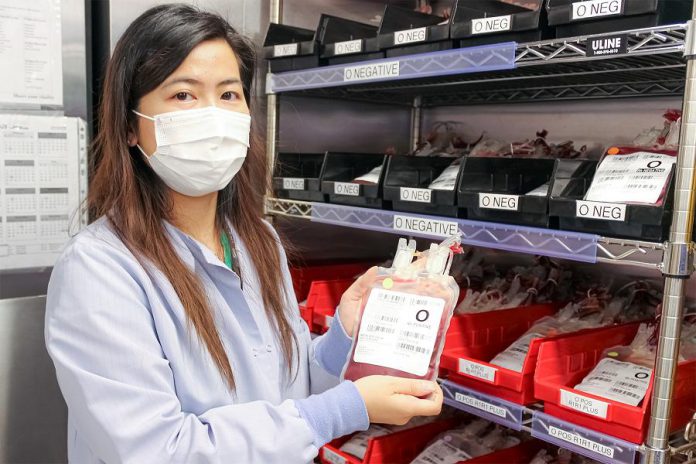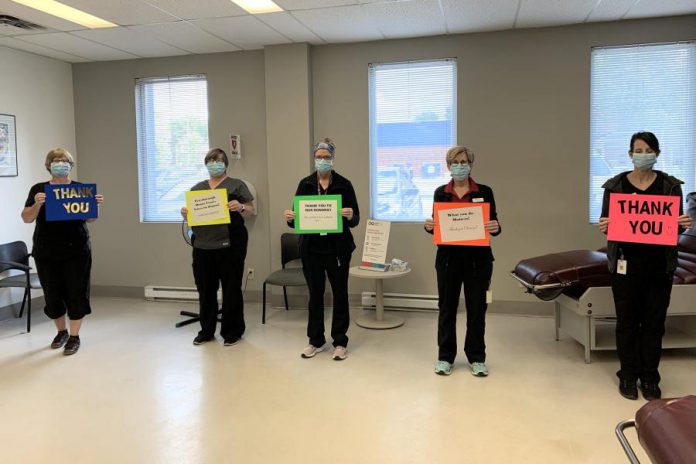
While the early months of the COVID-19 pandemic saw visits to hospital emergency departments drop significantly due to concerns over the virus’ spread, Canadian Blood Services saw just the opposite happen when it comes to blood donors.
According to Jill Gemmiti, events coordinator for the Peterborough branch of Canadian Blood Services, after the general shutdown in mid-March, the organization saw a sizable increase in local blood donations.
“We never closed … we put out so much more information about the need for blood,” recalls Gemmiti of that time. “Anyone who’s a regular blood donor is so committed to doing it. They saw the need and responded to it. The Peterborough community has been amazing.”
However, since that rush during the early weeks of the pandemic, Gemmiti admits things have settled down somewhat.
“A lot of people are working from home and don’t want to leave,” she says.
Now, with Canadian Blood Services in the midst of its September Childhood Cancer Awareness campaign with the Giving Thanks campaign earmarked for October, Gemmiti is hopeful for a like response as well as an uptick in first-time donors.
As of Wednesday (September 16), there were 114 open appointments at the Peterborough permanent clinic at 55 George Street North (at Perry Street across from Del Crary Park). But looking ahead to October, there are a whopping 410 appointments waiting to be filled.

To book an appointment in either month, visit www.blood.ca or phone 1-888-2 DONATE (236-6283). Gemitti notes the Give Blood app, through which an appointment can be booked, is also available for download on the Apple App Store and on Google Play.
The Peterborough clinic is open Tuesdays and Thursdays, 2 to 8 p.m., and Fridays, 8 a.m. to 2 p.m., as well as for a few hours every other Saturday.
The big COVID-related change is donors must have an appointment booked in advance — no walk-ins are permitted. Gemmiti explains that’s because of the need to reduce the number of people in the clinic at any one time.
“Come at your appointment time,” advises Gemmiti, adding “Don’t come an hour early. We can’t have you in the clinic.”
What hasn’t changed is the frequency which people can donate blood. For females it’s every 84 days; for males, it’s every 56 days.
For those who are concerned about donating blood during the pandemic, Gemmiti is quick to provide reassurance.
“Giving blood is probably the safest thing you can do,” she explains. “There are so many restrictions — we’re so careful.”
A quick check of Canadian Blood Services’ pandemic-related protocols bears that out. All donors are screened both when they make an appointment and when they come for their appointment, all equipment and surfaces (including donor beds) are frequently cleaned, masks are required in the donor centre, all chairs in waiting areas are spaced two metres apart as are donor beds, and laminated donor information pamphlets are sanitized after each use (or discarded if they are not laminated).
The full list of safety and wellness measures can be found at blood.ca/en/enhanced-wellness-measures-are-in-effect.

As Gemmiti eyes those open appointments in September and October, she notes she’s hopeful they will be filled — despite the fact that the outreach work she typically does is on hold.
“I used to go out into the community and do events to get people to book, but now I can’t do that,” she explains, adding that the busing of high school students to the permanent clinic is on indefinite hold, as is the hosting of mobile clinics at Trent University and area high schools.
“We’re trying to figure out all these new ways to get people to donate,” Gemmiti says. “We need media coverage, we need people like you (kawarthaNOW) to get the message out there. I can’t go to Petes’ games or all the different events I used to go to (for outreach), so I’m doing a lot more social media and things like that.”
“When I looked at October, I thought ‘Oh my gosh, we have so many appointments to book’,” she says, noting that Canadian Blood Services donates to 700 hospitals across Canada.
“We have to meet those orders. Every 60 seconds, someone in Canada needs blood. One car accident could require 50 units of blood. That adds up to 50 people donating. It’s a constant need. It never goes away.”
For more information about Canadian Blood Services and the extensive COVID-19 safety protocols in place, visit www.blood.ca.


























